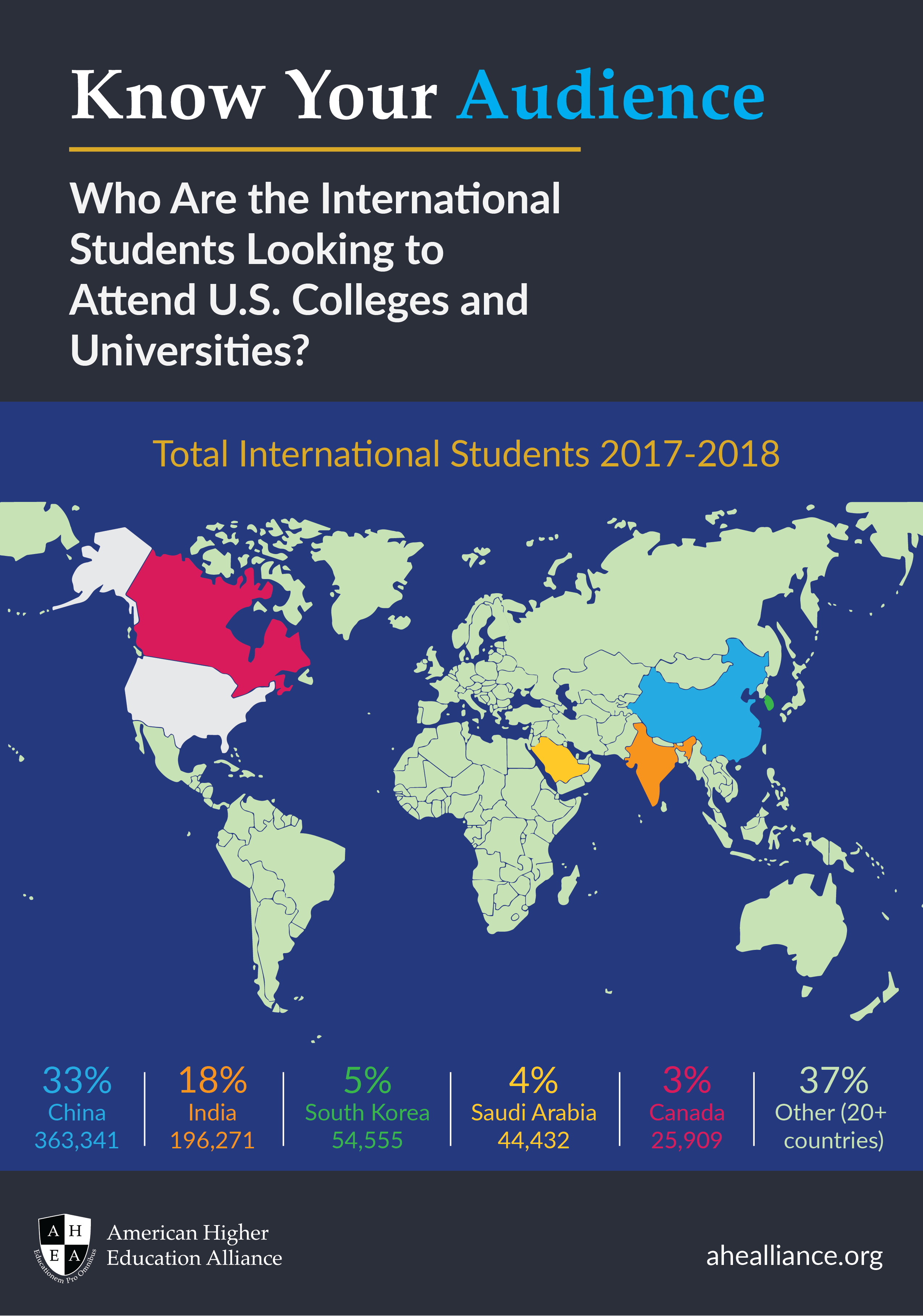
Know Your Audience
Who Are the International Students Looking to Attend U.S. Colleges and Universities?
For decades, international students have sought attendance at the renowned U.S. colleges and universities. Starting in 1854, the first Chinese international student graduated from Yale University according to The Wall Street Journal. Today more than one million international students study abroad in the U.S. (Institute of International Education’s (IIE) Open Doors report).
The IIE reports that 33.2% of the international students studying in the U.S. during 2017/18 hailed from China. In fact, the top three countries of origin are from Asia.
| Place of Origin | 2017/18 Students |
| China | 363,341 |
| India | 196,271 |
| South Korea | 54,555 |
| Saudi Arabia | 44,432 |
| Canada | 25,909 |

Interestingly, international students are not just from other countries. Almost 82,000 of international students were studying at U.S. high schools in 2016. This analysis by IIE also states that the majority of those high schoolers were degree-seeking students on F visas, and China was the leading country of origin.
Who Are These Students?
Knowing more information about prospective students’ information will enrich your marketing and messaging to international prospects. Since most of these students come from China, let’s take a closer look at who those students are.
The Chinese have valued higher education for centuries, and with the country’s economic reforms during the past decades, education at elite institutions has become more than possible. Approximately 65% of Chinese students secure their funding for higher education from family, and pay full tuition in most instances. That doesn’t make all of them filthy rich like the recent box-office hit, Crazy Rich Asians. Some are saving for decades.
Their primary education is different. The Chinese educational structure consists of a nine-year compulsory education that is for many followed by three years of senior high school. The focus of the education is exam-oriented and tutorial in nature. The teachers lecture and the students listen. Whereas in the U.S., students are encouraged to engage and ask questions. This difference can be challenging for Chinese students at U.S. colleges which expect, and even grade on, class participation.
Most of the Chinese students that complete high school go onto higher education. There are more than 10 million students applying for Chinese colleges and universities. The competition is extreme. The notorious national college entrance exam, gaokao, is grueling, intensifying the stress. It’s actually a criminal offense to cheat on the test, and if caught the student is banned from attending college for life.
Students must decide early in life if they want to study abroad. High school has different tracks depending on their decision. The students that hope to attend a Chinese university follow the gaokao track and study for success in the entrance exam. The other track has a bigger emphasis on English-language studies for better success at a school abroad. Some students go to private high schools that focus entirely on attending higher education abroad with concentrations not only in English, but also on the educational methods found abroad.
Once ready to start searching for the right international college or university, most Chinese students will conduct research online via social media -- Niche, WeChat, Weibo, and so on – well before they contact you. Approximately 75% of Chinese students apply to five institutions, or less.
Why They Want to Attend College Abroad
There are many reasons why international students wish to study abroad. The prestige of the U.S. higher education system is the number one reason, followed by:
- Attending a U.S. institution with an excellent reputations and academic programs.
- Gaining a global mindset and learning first-hand about other languages, cultures, and customs.
- Accessing more higher education options then what’s available in their home country.
- Attaining better future employment opportunities both in their home country and abroad.
In addition, Chinese students state these unique reasons:
- The gaokao exam, and the competition to attend China’s universities, is so stressful that many parents want their children to avoid taking it by studying abroad.
- Parents and students wish to attend an international college or university to demonstrate status.
- Students can study what they want in the U.S. In China, the student’s major is decided based on their gaokao results.
And what majors are Chinese students choosing? The most popular fields of study are engineering, business and management, and math and computer science, so it helps U.S. institutions to have those programs in place.
This is just a snapshot of the Chinese students looking to attend U.S colleges and universities. To truly understand them and market to them wisely, you will need more in-depth information about them. What are their likes and dislikes? What do they like to do? This information can be difficult to find. You can start organically, though, with the students you already have on campus. Survey them to get a better understanding of their education needs and desires.
